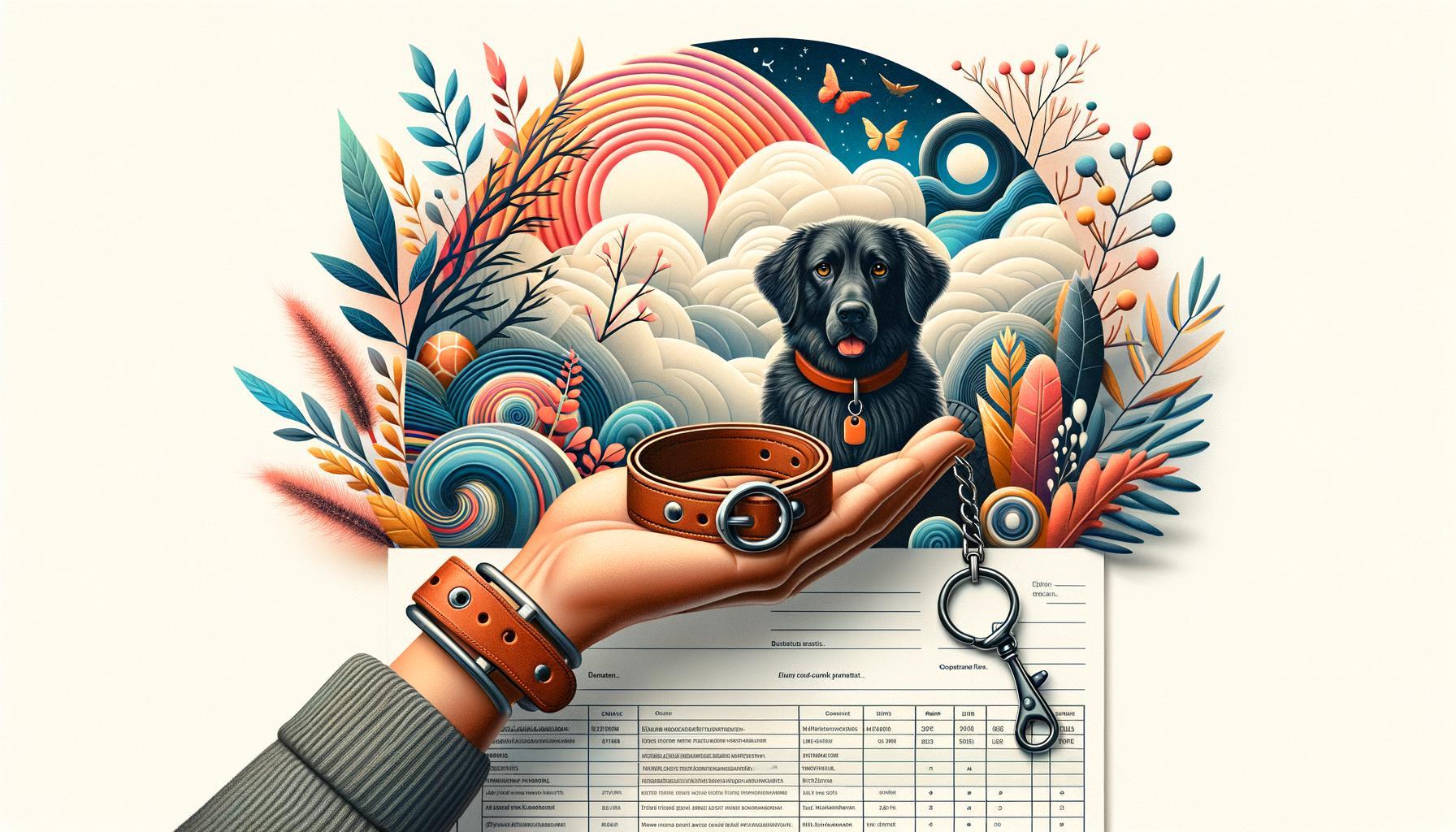In a world brimming with stress and unpredictability, the unconditional love of an emotional support dog can be a beacon of solace. These steadfast companions do more than just nuzzle away the blues; they provide comfort, companionship, and even a pathway to a more balanced life. Yet, behind those soulful eyes and wagging tails lies a topic often overlooked—what is the real cost of this invaluable support? In this article, we delve into the multifaceted expenses of owning an emotional support dog, shedding light on both the tangible and intangible investments that come with welcoming one of these remarkable canines into your life. Prepare to navigate the nuanced terrain where heartfelt companionship meets cold, hard numbers, revealing a holistic view of the true cost of this enduring bond.
Table of Contents
- Initial Investment and Adoption Fees
- Routine Veterinary Care and Health Expenses
- Day-to-Day Living Costs: Food, Toys, and More
- Training and Behavioral Classes: A Worthy Investment
- Unexpected Costs: Emergencies and Special Needs
- Financial Assistance and Budgeting Tips
- In Summary
Initial Investment and Adoption Fees
The first emotional step in welcoming an emotional support dog into your life involves understanding the initial investment. The **adoption fees** can vary widely depending on the source. Local animal shelters and rescue organizations typically have lower fees, ranging between $50 and $250. Conversely, if you decide to adopt from a specialized breeder, you might be looking at much higher costs, often ranging from $500 to $2,000. These fees usually cover basic necessities such as vaccinations, spaying or neutering, and the initial veterinary checkup.
Apart from the adoption fees, there are several other crucial first-time expenses that every pet owner should consider:
- Basic Supplies: Leash, collar, food bowls, and grooming brushes.
- Health Care: Initial vet visit, vaccinations, microchipping, and flea/tick prevention.
- Comfort: Bedding, crate, and toys for mental stimulation.
- Trainer: Optional yet advisable; initial training sessions can range from $50 to $120 per session.
| Expense | Estimated Cost |
|---|---|
| Adoption Fee | $50 - $2000 |
| Initial Vet Visit | $75 – $200 |
| Basic Supplies | $50 - $150 |
| Training Sessions | $200 – $600 |
When planning for your new furry companion, it’s crucial to budget for these initial expenses to ensure a smooth transition for both you and your emotional support dog.
Routine Veterinary Care and Health Expenses
Just like any other furry friend, an emotional support dog requires routine vet visits to stay healthy and ensure a long, happy life. These regular check-ups usually include **annual vaccinations, dental cleanings, and health screenings**. You might anticipate additional costs if your pet has any specific health concerns or dietary needs. Typically, standard check-ups can range from around $50 to $150, whereas dental care might cost between $200 and $500. Furthermore, flea, tick, and heartworm preventatives could tally up to about $100 to $200 annually.
Besides regular vet visits, unexpected health expenses can catch pet owners off guard. **Surgeries, emergency treatments, or chronic illness management** all add to the financial responsibility. Here’s a quick overview of potential costs:
| Service | Cost |
|---|---|
| Emergency Vet Visit | $200 – $1,000 |
| Major Surgery | $500 – $3,000 |
| Chronic Condition Management | $50 – $200/month |
Day-to-Day Living Costs: Food, Toys, and More
One of the initial considerations that come to mind when bringing an emotional support dog into your home is ensuring they are well-fed and happy. **Quality food** goes a long way in maintaining their health, and it’s important to budget for it accordingly. **Premium dog food** can cost anywhere from $30 to $60 per month, depending on the size and breed of your dog. **Budget-friendly options** may be less costly, around $20 to $40, but it’s crucial to balance cost with nutritional value. Besides food, it’s essential to think about **vitamins and supplements**, which can add an extra $10 to $30 per month. Remember, a well-nourished dog is a happy and supportive companion.
Apart from food, emotional support dogs also need stimulation and engagement. **Toys** are a great way to keep them entertained and mentally sharp. Basic toys such as chew bones and balls may cost around $5 to $15 each, whereas more complex, interactive toys can range from $20 to $50. Additionally, **annual vet visits** for check-ups and vaccinations should be factored in, averaging about $50 to $150 per visit. Below is a quick breakdown of some estimated monthly costs to give you a clearer picture:
| Expense | Estimated Cost |
|---|---|
| Premium Dog Food | $30 - $60 |
| Vitamins & Supplements | $10 – $30 |
| Toys | $20 – $50 |
| Vet Visits (per year) | $50 – $150 |
Training and Behavioral Classes: A Worthy Investment
Investing in training and behavioral classes plays a crucial role in the development of an emotional support dog. These classes ensure your furry friend is well-behaved, responsive, and able to assist you effectively. They address multiple aspects, from basic commands to complex behavioral adjustments, making the dog a confident and reliable companion. Training not only enhances the bond between you and your dog but also instills a sense of structure and routine, which is beneficial for both parties.
- Basic Obedience Training: Teaching sit, stay, come, and heel commands.
- Advanced Behavioral Classes: Addressing specific issues like anxiety or aggression.
- Socialization Sessions: Ensuring your dog is comfortable around other animals and people.
The investment in these classes often translates into significant benefits, which can be quantified as follows:
| Training Aspect | Average Cost | Benefit |
|---|---|---|
| Basic Obedience | $50 – $100 per session | Improved daily interactions |
| Advanced Behavioral | $150 – $200 per session | Long-term emotional support |
| Socialization Classes | $30 – $70 per session | Better adaptability |
Beyond the monetary aspect, the investment in training ensures your dog is well-equipped to provide the emotional support you need, elevating your mutual well-being.
Unexpected Costs: Emergencies and Special Needs
Life comes with its share of uncertainties, and when you have an emotional support dog, unexpected costs can sneak up on you. Emergencies like sudden illnesses or accidents can lead to **veterinary bills** that accumulate quickly. Consider the expenses for emergency vet visits, surgeries, or advanced diagnostic tests. Having a pet insurance plan might help, but not all policies cover every scenario. Besides emergency care, your emotional support dog might require more frequent checkups or specialized treatments for certain conditions, adding to the financial strain.
| Unexpected Cost | Possible Expense (USD) |
|---|---|
| Emergency Vet Visit | $100 – $300 |
| Pet Surgery | $500 – $4,000 |
| Specialized Treatments | $200 – $1,500 |
Moreover, certain emotional support dogs have **special needs** that can translate into recurring expenses. This could include a tailored diet, regular grooming, or behavioral training. High-quality, specialized dog food can be pricier than standard options, adding up over time. Regular grooming, especially for dogs with specific coat types, might also become a monthly requirement, contributing to the overall cost. Training sessions tailored to improve behavior or address specific issues can also add an extra layer of expenses but are often necessary to ensure a harmonious relationship.
- Special Diet: $50 – $100 per month
- Grooming: $30 – $90 per session
- Behavioral Training: $50 – $100 per session
Financial Assistance and Budgeting Tips
Having an emotional support dog can be a source of immense comfort, but it’s essential to plan financially for this commitment. Start by researching **assistance programs** that may alleviate initial costs. Local animal shelters often offer reduced adoption fees, while some organizations provide **veterinary care discounts** for those with financial constraints. Remember to check if you qualify for **grant programs** for emotional support animals, as these may reduce your upfront expenses significantly.
Once your new companion is home, planning a **realistic budget** is key. Consider including the essential monthly expenses, which typically cover:
- Food: High-quality dog food ensures a healthy diet.
- Healthcare: Regular check-ups and vaccinations are crucial.
- Grooming: Essential for keeping your pet clean and comfortable.
- Training: Necessary for good behavior and a strong bond.
To help visualize these costs, here’s a simple breakdown:
| Monthly Expense | Average Cost |
|---|---|
| Food | $50 – $100 |
| Healthcare | $20 – $50 |
| Grooming | $30 – $60 |
| Training | $40 - $100 |
By planning and budgeting carefully, you can ensure a harmonious and financially sound experience with your emotional support dog.
In Summary
As we wrap up our exploration into the financial landscape of owning an emotional support dog, it’s clear that the journey involves more than just companionship—it’s an investment in well-being. From initial adoption fees to ongoing medical expenses, grooming, and specialized training, each cost represents a building block in the foundation of a mutually rewarding relationship between you and your four-legged friend.
While the numbers can add up, so do the moments of tranquility, the easing of stress, and the simple joy of a wagging tail greeting you at the door. Each dollar spent is a step closer to a more balanced, emotionally enriched life.
understanding the financial commitment is key to ensuring that your emotional support dog can provide the comfort and stability you seek, without unexpected financial strain. The bond you forge with your canine companion is priceless, and careful planning can make this invaluable connection a sustainable and joyous reality.
Thank you for taking this journey with us, and may your path with your emotional support dog be as smooth and fulfilling as possible.







Leave a Reply